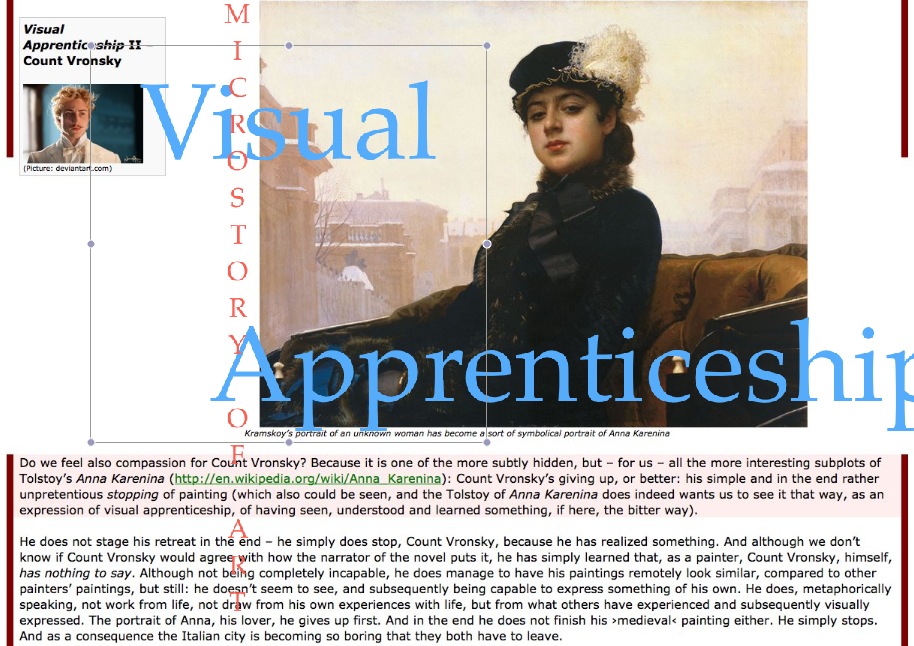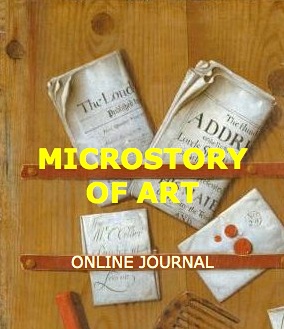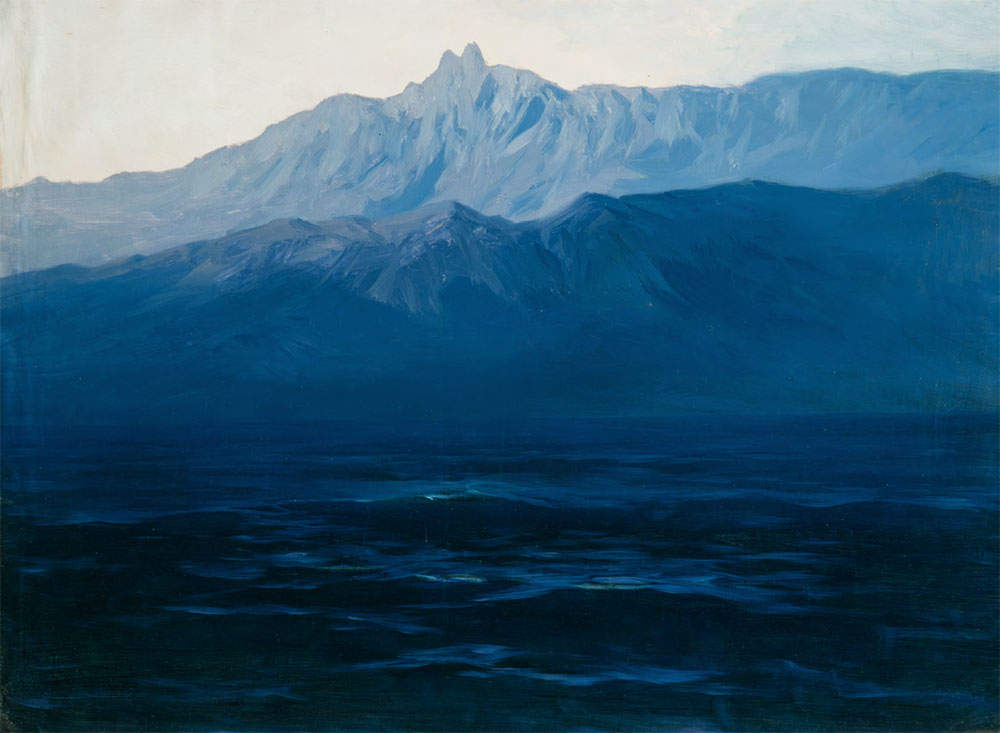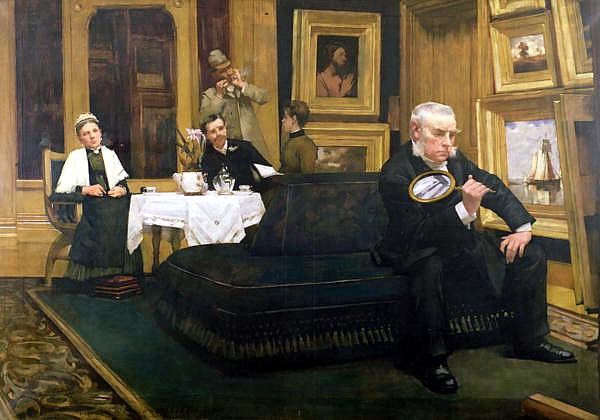M
I
C
R
O
S
T
O
R
Y
O
F
A
R
T
........................................................

NOW COMPLETED:

........................................................
MICROSTORY OF ART
ONLINE JOURNAL FOR ART, CONNOISSEURSHIP
AND CULTURAL JOURNALISM
........................................................
INDEX | PINBOARD | MICROSTORIES |
FEATURES | SPECIAL EDITIONS |
HISTORY AND THEORY OF ATTRIBUTION |
ETHNOGRAPHY OF CONNOISSEURSHIP |
SEARCH

........................................................



 >MICROSTORIES
>MICROSTORIES
- Richard Serra
- Martin Scorsese
- Claude Simon
- Sunshine
- Werner Herzog
- The Creation
- Marcel Duchamp
- Nino Rota
- Wölfflin and Woolf
- Hansjörg Schneider
- Kraftort Arkadien
- Visual Biography
- Schlaraffenleben
- Die Geisteswissenschaften
- The Voyeur
- Buzzword Sustainability
- Paul Verlaine
- Tao Yuanming
- New Beginning
- Seneca
- Still Lifes
- Charles Baudelaire
- Frédéric Chopin
- The Art History of Sustainability
- Wang Wei
- Solarpunk
- Historians of Light
- Lepanto
- Renaturalization
- Plates
- Snow in Provence
- Learning to See
- Picasso Dictionaries
- Peach Blossom Spring
- Picasso Tourism
- Tipping Points
- Sviatoslav Richter
- Weather Reports
- Treasure Hunt
- Another Snowscape in Picasso
- Picasso in 2023
- Dragon Veins
- The Gloomy Day
- The Art of the Pentimento
- Reforestation
- The Status of Painting
- Emergency Supply
- Punctuality
- Watching Traffic
- Zhong Kui
- How Painting Survived the 1990s
- Confirmation Bias
- Sustainability and Luxury
- Garage Bands
- Picasso and Artificial Intelligence
- Eyes of Tomorrow
- Picasso in 2023 2
- Gluing Oneself to Something
- Suburbia
- Bamboo
- Sustainability and Carpe Diem 1
- Interviews with Bruegel
- Sustainability and Carpe Diem 2
- Coffee & Sugar
- Bamboo 2
- Picasso in 2023 3
- Sustainability and Carpe Diem 3
- Cherry Orchard
- Old Magazines
- Chance
- Nick Drake
- Harlequin
- The Smartphone & the Art Book
- Atlas Syndrome
- The Kitchen
- Atlas Syndrome 2
- Consideration
- Tori Amos
- School
- Orchard Auctioning Day
- The Hundred Years’ War
- Sócrates
- Chameleon
- Nefertiti Bust
- Picasso as a Computer
- Sunflowers
- Philemon & Baucis
- Ode to the Radio
- Childhood
- Wimmelbild
- Restitution
- Nick Drake 2
- Wishful Thinking
- Sundays
- The Independent Scholar
- September
- The Fisherman by Pirosmani
- Microadventure
- Sociology
- Salvator Mundi
- Chillon
- Appassionata
- Amber
- Homer
- Berlin
- Planet Walk
- Improvisation
- Seeing Picasso
- These Nice Kids
- Robber
- The One
- The Sea Turtle
- Zoo
- Through the Hush
- Wunderkammer
- I Do Not Seek, I Find
- Shopping Mall
- Food Hamper
- The Secretary
- This Gate
- Nor Rainy Day
- House on a Hill
- Beautiful Island
- Second-hand Bookstore
- Flat
- Slap in the Face
- Serra, Wenkenpark
- Apologies
- The Bells
- Nordmann Fir
- Picasso Wanting To Be Poor
- Picasso, Pirosmani
- A Brief History of Sculpture
- 24 Sunsets
- Rusty Phoenix
- Glove
- Wintry Stanza
- A Song
- Like A Beatle
- Catching An Orange
- Solar Bees
- Permaculture

 >FEATURES
>FEATURES
- Van Gogh On Connoisseurship
- Two Museum’s Men
- Ende Pintrix and the City in Flames
- Titian, Leonardo and the Blue Hour
- The Man with the Golden Helmet: a documentation
- Un Jury d’admission à l’expertise
- Learning to See in Hitler’s Munich
- Leonardo da Vinci and Switzerland
- The Blue Hour Continued
- The Blue Hour in Louis Malle
- Kafka in the Blue Hour
- Blue Matisse
- Blue Hours of Hamburg and LA
- A Brief History of the Cranberry
- The Other Liberale in the House
- The Blue Hour in Raphael
- Who Did Invent the Blue Hour?
- Monet on Sustainability
- Velázquez and Sustainability
- The Blue Hour in Guillaume Apollinaire
- Van Gogh on Sustainability
- The Blue Hour in Marcel Proust
- Picasso and Sustainability
- The Contemporary Blue Hour
- The Blue Hour in 1492
- The Blue Hour in Hopper and Rothko
- Hopper and Sustainability
- The Blue Hour in Ecotopia
- The Hour Blue in Joan Mitchell
- Explaining the Twilight
- The Twilight of Thaw
- The Blue Hour in Pierre Bonnard
- Explaining the Twilight 2
- Picasso on Stalin
- Rubens on Sustainability
- The Salvator Mundi in Bruegel and Rubens
- The Blue Hour in Leonardo da Vinci and Poussin
- The Blue Hour in Rimbaud
- Faking the Dawn
- Frost and Thaw in Ilya Ehrenburg
- Picasso, Stalin, Beria
- Picasso, Solzhenitsyn and the Gulag
- Shostakovich on Picasso
- Hélène Parmelin in 1956
- Historians of Picasso Blue
- Picasso Travelling to Moscow 1
- The Blue Hour in Caravaggio
- Picasso Travelling to Moscow 2
- Picasso, the Knife Game and the Unsettling in Art
- Some Notes on Leonardo da Vinci and Slavery
- Picasso Moving to the Swiss Goldcoast
- The Blue Hour in Camus
- The Blue Hour in Symbolism and Surrealism
- Caspar David Friedrich in His Element
- Exhibiting the Northern Light
- Caspar David Friedrich in His Element 2
- Robert Schumann and the History of the Nocturne
- The Blue Hour in Robert Schumann
- Caspar David Friedrich and Sustainability
- The Twilight of Thaw 2
- Multicultural Twilight
- The Blue Hour in Anton Chekhov
- The Blue Hour in Medieval Art
- Twilight Photography
- The Blue Hour in Bob Dylan
- Iconography of Optimism

 >SPECIAL EDITIONS
>SPECIAL EDITIONS
- Visions of Cosmopolis
- Mona Lisa Landscapes
- Turner and Ruskin at Rheinfelden
- Painters On TV & On TV
- Spazzacamini in Art
- A Last Glance at Le Jardin de Daubigny
- The Experimental Cicerone
- A Dictionary of Imaginary Art Historical Works
- Iconography of Blogging
- Begegnung auf dem Münsterplatz
- Cecom
- Das Projekt Visual Apprenticeship
- Those Who See More
- A Fox on Seeing with the Heart
- Sammlung Werner Weisbach
- Daubigny Revisited
- Some Salvator Mundi Microstories
- Some Salvator Mundi Afterthougths
- Some Salvator Mundi Variations
- Some Salvator Mundi Revisions
- A Salvator Mundi Questionnaire
- A Salvator Mundi Puzzle
- Unknown Melzi
- Francis I and the Crown of Charlemagne
- From Amboise to Fontainebleau
- Drones Above Chambord
- Looking Back At Conques
- Flaubert At Fontainebleau
- Images of Imperial Ideology
- The Chronicles of Santa Maria delle Grazie
- Seeing Right Through Someone
- Melzi the Secretary
- Eying Glass
- A Foil to the Mona Lisa
- A Renaissance of the Cartoon
- Sketching a Family Tree
- Venetian Variations
- A Brief History of Digital Restoring
- A Consortium of Painters
- Leonardeschi and Landscape
- A Christ in Profile
- Learning to See in Spanish Milan
- A History of Gestures
- Leonardo and Josquin
- A Renaissance of the Hybrid
- Suida and Heydenreich
- The Watershed
- Three Veils
- From Beginning to End
- Connoisseurship of AI
- Twilight and Enlightenment
- The Blue Hour in Chinese Painting
- Dusk and Dawn at La Californie
- Iconography of Sustainability
- The Blue Hour in Goethe and Stendhal
- The Sky in Verlaine
- The Blue Hour in Paul Klee
- Iconography of Sustainability 2
- The Blue Hour in Charles Baudelaire
- From Bruegel to Solarpunk
- Some Salvator Mundi Documentaries
- Some More Salvator Mundi Monkey Business
- The Windsor Sleeve
- Brigitte Bardot’s Encounter with Picasso
- Art Historians and Historians
- A Salvator Mundi Chronicle
- The Salvator Mundi and the French Revolution
- The Fontainebleau Group
- The Encounter of Harry Truman with Pablo Picasso
- The Fontainebleau Group Continued
- The Windsor Sleeve Continued
- The Salvator Mundi in Early Netherlandish Painting 1
- Some Salvator Mundi Resources
- A New Salvator Mundi Questionnaire
- The Woman in Picasso
- The Yarborough Group
- Melzi, Figino and the Mona Lisa
- The Yarborough Group Continued
- A Salvator Mundi Global History
- The Salvator Mundi in Medieval Art
- The Salvator Mundi in Medieval Art 2
- The Salvator Mundi in Early Netherlandish Painting 2


 >HISTORY AND THEORY OF ATTRIBUTION
>HISTORY AND THEORY OF ATTRIBUTION
- The Mysterious »Donna Laura Minghetti-Leonardo«
- Assorted Demons of Connoisseurship
- Panofsky Meets Morelli
- Discovering the Eye of Sherlock Holmes
- Handling the Left-handed Hatchings Argument
- Visual History of Connoisseurship
- Alexander Perrig
- Connoisseurship in 2666
- What Postmodernity Has Done to Connoisseurship
- Dividing Four Fab Hands
- A Leonardesque Ambassador
- Test Cases in Connoisseurship
- A Raphael Expertise
- How to Tell Titian from Giorgione
- Louise Richter
- The Unique Property in the History of Connoisseurship
- An Expertise by Berenson
- The Book of Expertises
- An Album of Expertises
- An Expertise by Friedländer
- A Salvator Mundi Provenance
- How to Tell Leonardo from Luini
- An Expertise by Crowe and Cavalcaselle
- An Expertise by Bayersdorfer
- An Expertise by Hermann Voss
- An Expertise by Hofstede de Groot
- Leonardeschi Gold Rush
- An Unknown »Vermeer«
- An Expertise by Roberto Longhi
- An Expertise by Federico Zeri
- A Salvator Mundi Geography
- A Salvator Mundi Atlas
- The Bias of Superficiality
- 32 Ways of Looking at a Puzzle
- James Cahill versus Zhang Daqian
- Five Fallacies in Attribution
- On Why Art History Cannot Be Outsourced to Art Dealers
- On Why Artificial Intelligence Has No Place in Connoisseurship
- Salvator Mundi Scholarship in 2016
- Leonardo da Vinci at the Courts
- The Story of the Lost Axe
- The Last Bruegel
- A Titian Questionnaire
- On Where and Why the Salvator Mundi Authentication Did Fail
- The Problem of Deattribution

 >ETHNOGRAPHY OF CONNOISSEURSHIP
>ETHNOGRAPHY OF CONNOISSEURSHIP
MICROSTORY OF ART
ONLINE JOURNAL FOR ART, CONNOISSEURSHIP
AND CULTURAL JOURNALISM
........................................................

***
ARCHIVE AND FURTHER PROJECTS

1) PRINT


***
2) E-PRODUCTIONS


........................................................

........................................................

........................................................
FORTHCOMING:


***
3) VARIA

........................................................

........................................................

........................................................

........................................................

........................................................
***
THE GIOVANNI MORELLI MONOGRAPH

- The Giovanni Morelli Monograph
........................................................
MICROSTORY OF ART
ONLINE JOURNAL FOR ART, CONNOISSEURSHIP AND CULTURAL JOURNALISM
HOME
MICROSTORY OF ART
MICROSTORY OF ART
ONLINE JOURNAL FOR ART, CONNOISSEURSHIP AND CULTURAL JOURNALISM

Dedicated to Sustainability and Carpe Diem, again

(Picture: DS, Carpe Diem)

(Picture: DS)
Sustainability and Carpe Diem (3)
(29.6.2023) The Homo Carpe Diem is a spontaneous traveller, certainly, and, at times, even an easyjetter. The Homo Wiseforesightiensis, the proponent of sustainability, is no spontaneous traveller. A traveller, yes, perhaps, but only after much reflection, after researching, for example, if a location can be reached without flying being necessary. But occasionally also the Homo Wiseforesightiensis is discovering his inner Homo Carpe Diem, embarking on a trip with, perhaps, not enough reflection. Because at airports people might see you, and if you happen to be a prominent proponent of sustainability and, perhaps, even a prominent climate-gluer, this might result in a little scandal and people might accuse you of hypocrisy. But one thing is for sure: it is travelling, the field of travelling, that can and has to be mapped, if we want to become aware of contemporary beliefs and ideologies. And this is the endeavor we are undertaking here.
1) Mapping the Territory of Today’s Tourism Industry
The situation, in 2023, is this: the economy wants and needs the consumer to be a Homo Carpe Diem. But since also the Homo Wiseforesightiensis is on the rise, has been on the rise for quite some time, this results with a problem. Since the Homo Wiseforesightiensis is not a consumer according to the wishes of the economy, in that the Homo Wiseforesightiensis is reflecting about what is or might be necessary and what is or might be not. And the consumer consuming only the necessary minimum of anything cannot be a consumer according to the wishes of the economy, even if this economy is honestly propagating sustainability.
We are observing various strategies of the economy, especially of the branch of the tourism industry that interests us here, strategies that deal with this problem.
A) The tourism industry is offering a choice selection of travelling opportunities that all, apparently, meet the goals of sustainability, are designed and chosen according to the ideals of sustainability. This is the strategy that one could name the ›we think for you, so that you can be a Homo Carpe Diem without a bad conscience‹. ›We‹, the travelling industry, which is modelled here as the ideal Homo Wiseforesightiensis, which, at the same time, is inviting the consumer to do what he or she wants. B) The question of what is necessary and what is not, gets as little attention as possible. Which is not only the strategy the tourism industry is using, but the economy – the supermarket – as such. The supermarket is a particularly busy proponent of sustainability, while at the same time the supermarket supplies an already affluent socienty with much more than the necessary goods. And if the supermarket indeed would want its customers to be Homini Wiseforesightiensis, the supermarket would have to raise the question of how much and to what purpose, and this would not necessarily be in the interest of the supermarket. Which tends to use also strategy a) (We think for you, so that you can be a consumer without a bad conscience, a Homo Carpe Diem consumer), but not as unreserved as the tourist industry (which felt the Corona shock most intensely) does use it.
2) Negotiating the Degree of Necessary Travelling
If a radical proponent of sustainability is ›caught‹ using a plane, a little scandal follows, because people might accuse the proponent of sustainability of hypocrisy. But more interesting are the arguments being used to defend respectively to accuse the traveller using a plane. Academics, eager to show themselves on international conferences, cannot be happy with harsh restrictions on flying. Careers depend on opportunities to show oneself, and networking, perhaps, does not work particularly good in video conferencing.
But what if the goal of travelling is actually – having no exact goal? Since the meaning of travelling can be: renew oneself by placing oneself into unfamiliar locations and settings, with no exact goal of what might be the effect or the result of that, exept perhaps: developing. Is it legitimate to just wishing to see Mexico? And if no, who decides over what people are allowed to do (with a bad conscience or without)?
Might it be convincing to argue that: I just did take a flight to scandalize the lack of alternatives to taking a flight? Probably not.
But on sociological level we are observing all kinds of negotiations in contemporary culture, negotiations that one might also interpret as filling the voids of an all-too abstract discourse on sustainability. Various dimensions, yes. Harmony between economy, ecology and society, yes. Needs of generations to come, and needs of today, yes – but what does all that mean in practice? Every social system, every society has still to find out. And harmony of viewpoints is certainly not the most likely state in a social system at all. Conflict is more likely, while ideologies do present worlds full of harmony (see above) and without conflict (of aims).
3) A Pre-Corona World vs. a World Without Flights
Having memories, in 2023, of really bad meals, meals that are, or were offered aboard of a plane, is, in 2023, a really interesting subject matter. Since visions do exist of a world without flights, and of a world in which eating is the subject of all kinds of restrictions. And if such visions would become reality, our memories of really bad meals could turn into something really stimulating a bad conscience. Our sins of the past might come back, in terms of accusations. Accusations of having eaten a) too much b) the wrong food and c) aboard of a plane (for which there is conpensation necessary already today). But the Homo Carpe Diem is not a vision of the past, not a someone of which we know that, in hindsight, he/she etc. did exist. Once, in a distant past. No, the Homo Carpe Diem, see above, is a someone that the tourism industry is counting on. A someone the economy is counting on. And if the economy is the most eager proponent of sustainability, more eager, perhaps, that the climate-gluer caught on an airport, a little cautiousness is at place. In 2023, the world has become ideological, and ideologies could be understood as the quintessential bubbles, since they tend to become invisible – due to proponents of ideologies wanting them to be so.

The Art Museum of Sustainability
Monet on Sustainability
Velázquez on Sustainability
Van Gogh on Sustainability
Picasso and Sustainability
Hopper and Sustainability
Rubens on Sustainability
Caspar David Friedrich and Sustainability

Iconography of Sustainability
Iconography of Sustainability
Iconography of Sustainability 2
From Bruegel to Solarpunk (Iconography of Sustainability 3)
Sustainability and Carpe Diem 1
Sustainability and Carpe Diem 2

Concepts, Labels and Varia
Solarpunk
Renaturalization
Tipping Points
The Blue Hour in Ecotopia
Reforestation
Emergency Supply
Sustainability and Luxury
Eyes of Tomorrow
Bamboo
MICROSTORY OF ART
ONLINE JOURNAL FOR ART, CONNOISSEURSHIP AND CULTURAL JOURNALISM
HOME
© DS
